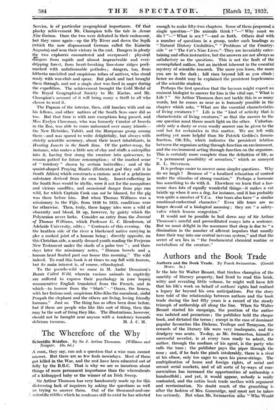The Wherefore of the Why
gclentific Riddles. By Sir J. Arthur Thomson. (Williams slid Norgate. 10s. WO A Fool., they say, can ask a question that a wise man canriot answer. But there are so few fools nowadays. Most of them got killed in...the..War, and the rest have been educated out of f011y by the B.B.C. That is why we are so incurious abqut things of more permanent importance than the whereabouts of a kidnapped baby or the winner of an Irish Sweep.
Sir Arthur Thomson has very handsomely made up for this distressing lack of 'inquirers by asking the questions as well as trying to answer them. Out of the thousand-and-one Lseientific riddles'which he confesses still to exist he has selected enough to make fifty-two chapters. Some of thein propound single question—" Do animals think ? "—" Why must we die ? "—" What is sex ? "—and so forth. Others deal with a number of questions in a group, under such headings as " Natural History Credulities," "Problems of the Country- side " or " The Cat's Nine Lives." --They are invariably enter- taining and often instructive, but the answers are not always so satisfactory as the questions. This is not the fault of the accomplished author, but an incident inherent in the essential mystery of scientific research. The more you learn, the more you are in the dark ; hill rises beyond hill as . you climb ; hence no doubt may be explained the persistent hopelessness of the scientific student. _..-
Perhaps the first question that the layman might expect an eminent biologist to answer for him is the vital one, " What is Life ? " Sir Arthur Thomson does not tackle this in so many words, but he comes as- near as is humanly possible in the chapter which asks, " What are the essential characteristics of living creatures ? " Life is the " kind of activity that is characteristic of living creatures," so that the answer to the one question must throw much light on the other. Urifortiin- ately only a dusty or even woolly answer can be given to the soul hot for certainties in this matter. We are left with nothing yet more helpful than Sir Patrick Geddes's famous fraction, OfelEfo, which indicates the persistent relation between the organism acting through function on environment, and the environment acting through function on the organism. This is certainly more complete than the definition of life, as " a permanent possibility of sensation," which so annoyed
IL L. Stevenson. • • It is perhaps easier to answer some simpler questions. Why do we laugh ? Because of " a localized relaxation of control under the stimulus of strong emotion." Perhaps a hormone has something to do With it. Elsewhere we learn that a hor- mone does lots of equally wonderful things—it makes a eat bristle up when it sees a dog, for instance, and it has probably won quite a number of V.C.s. Our tears also have " a similar emotional-endocrinal character." Even idle tears are no longer-devoid of a biological meaning ; they are " a safety- valve which lessens congestion."
It would not be possible to boil down any of Sir Arthur Thomson's careful and premeditated essays into a sentence. But we must delight in the assurance that sleep is due to "-a diminution in the number of afferent impulses that usually force their way into our central nervous system," and that the secret of sex lies in " the fundamental chemical routine or metabolism of the creature."


















































 Previous page
Previous page